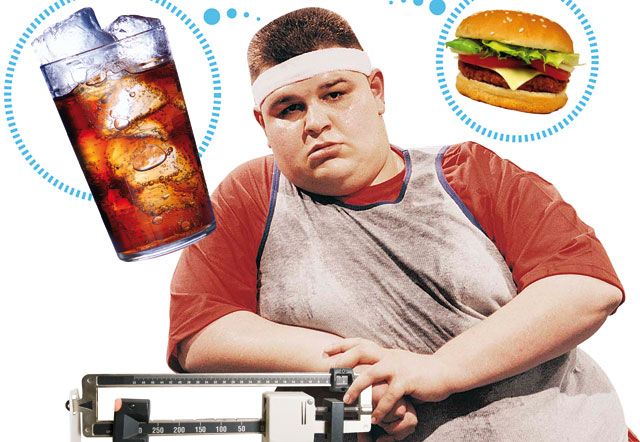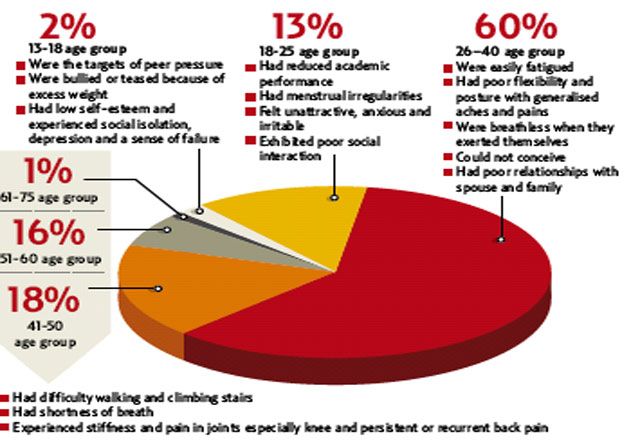In the UAE some universities are leading by example when it comes to combating obesity and promoting healthy living among its students. Dubai Women's College (DWC) has taken responsibility for its students' health by integrating nutritional and physical education (PE) into the first year student curriculum. Suzanne Trease, Chair of the Department of Health and Physical Education said students are taught about health and wellbeing right from the basics of food intake and energy levels.
"When the ladies first come they don't have a background on the importance of exercise and no experience in health and physical education," she said.
Trease said at first the concept can be quite a challenge for students because they do not understand the importance of healthy living. However, by the second semester it becomes part of their everyday life.
Healthy living is reinforced by the college administration and cafeteria that serves no fast foods or meals containing trans-fats, and bans soft drinks on campus.
Upbringing and lifestyle
Trease blames a sedentary lifestyle for the rise of obesity in the UAE. "A lot of them [students] have things done for them," she said. Trease said that from observation, physical activity is not typically part of the Emirati culture and is therefore not instilled in children by parents. "If we start here with these ladies, hopefully the next generation will incorporate physical activity into their lifestyle."
She added: "Physical activity is not encouraged for women here." She said she has observed that PE is not part of girls' development, and this is evident in their weak motor skills. "Basic motor and coordination skills are not there and if they are, they're not refined."
Trease stressed the urgency of incorporating healthy living into UAE's lifestyle. "It's imperative we educate this generation and those to come, about healthy living because if we don't, life expectancy will grow even shorter. If you can walk moderately for 30 minutes a day and keep your heart rate above 130 beats per minute, that's a great start."
Making changes
Other institutions have picked up on the importance of the youth's growing health problems. Dr Nabeel Ebrahim, chancellor of Abu Dhabi University (ADU), said the university plans to introduce an academic programme next year in health sciences, which will include the study of obesity. In the meantime short courses and seminars as well as awareness campaigns organised by the on-campus clinic help educate students and staff on the matter.
The chancellor said ADU is launching the health sciences programme because "although we have not seen obesity as a major problem on campus it goes farther than the campus community". He said it is a growing problem that won't simply disappear. So preparation is a must.
Students' efforts
Two Zayed University students in Abu Dhabi are also trying to draw attention to obesity. Mariam Al Hammadi and Sumaya Al Qudaimi's entry for the recent Manchester Innovation Award organised by Manchester Business School and the Khalifa Fund for Enterprise Development, proposed a health-conscious restaurant.
Their submission was based on an idea for the first healthy, environmentally-conscious restaurant located in the UAE. The proposed ‘Hawa Society' (‘hawa' means ‘air' in Arabic) is a restaurant that provides specially-designed menus for the health-conscious and those with special dietary needs.
"We strongly believe in the strategy that the customers are always right, so we undertook market research for our restaurant with residents and students to discover people's opinions about what sort of restaurant they prefer," said Sumaya.
The research found that 65 per cent of males prefer healthy food while 35 per cent prefer fast/convenient food. This compared to 70 per cent of females who preferred healthy food and 30 per cent who preferred fast/convenient food. Further investigation found that 17 per cent of people with special needs are unwilling to go to restaurants because they have difficulty in communicating with others.
Obesity research
Health and weight management company VLCC is working with the government to combat obesity among adolescents.
The organisation's research and development team recently embarked on two projects to determine the level of obesity and the nutritional, lifestyle, psychological and health status of people in the Middle East. They aim to use the data to introduce nutritional and psychological counselling for adolescents.
The VLCC study is based on 5,000 participants in the region who sought to lose weight at the centre. The study found that almost half of the weight-loss seekers were obese. Of this 7 per cent were morbidly obese.
"Recent years have shown an increase in the number of overweight or obese adolescents, possibly because of a sedentary lifestyle and increased fat content in people's diets, particularly affluent families," said Vandana Luthra, VLCC founder and mentor.
"The UAE records one of the highest rates of obesity in the world with almost 70 per cent of the population suffering from the malady." But there's limited data on obesity in the region, which is the reason for the research study, she added.
The health company is also running an anti-obesity campaign across the region until December 18. Another initiative is a 10km cycle-a-thon on December 18 in Dubai to raise awareness about the issue.
Study links fizzy drinks to obesity
Think twice before you guzzle down that next can of cola. With more than 80 per cent of the UAE's adolescent and young women regularly downing fizzy drinks, they run a higher risk of becoming obese and getting osteoporosis later in life.
These were the findings of a study conducted by Dubai Medical College students, titled ‘Health Effects of Soda Drinking in Adolescent Girls in the UAE'. The study was published in the international medical Journal of Critical Care.
The students tested about 300 adolescents in the 10-22 age group from Al Raya High School, Al Sorouq Private School, Dubai Modern Education School and Dubai Medical College for Girls. "Soda drinking was associated with higher risk of obesity and decreasing levels of blood calcium and increasing urinary calcium excretion, which may lead to osteoporosis later in life," they concluded.
Findings
The study found that 81.8 per cent of the students consumed fizzy drinks. More than half of the fizzy drinkers drank more than one can (330ml) a day.
Results showed more tooth decay among soda drinkers although there was no discrepancy in bone problems. However, a Harvard School of Public Health study revealed that active teenage girls who drank cola beverages had a bone fracture risk almost five times higher than girls who did not.
Interestingly, the paper reveals the switch by soft drink makers from sucrose to high-fructose corn syrups as the primary sweetener in the early 1980s may be the cause of high risk dental complications.
Dangers
Previous studies have found that fizzy drinks, particularly colas, may contribute to obesity and cavities among young people. Scientists have suggested that phosphoric acid may be harmful as well as fructose, a sweetener believed to cause increased calcium loss. The World Health Organisation has also recognised the role of fructose in the prevalence of obesity.
Winning the weight war
"I've been overweight all my life," says Nina Rachel Roy, 17, who managed to lose more than 15kg in the past year through a carefully monitored diet and exercise plan.
It was when her weight reached 73kg that she started her battle of the bulge. "It was when I was studying for my board exams that I put on the weight. All I did was study, eat and sleep — I was 65kg before the exams."
Only after her exams did Roy realise with a shock how much weight she had gained.
The plan
It prompted the grade 12 student to seek professional help in the form of health and weight management company VLCC where she met a dietician who formulated an eating and exercise plan for her.
Roy said the dietician analysed her eating habits and pointed out where she was going wrong.
Initially Roy did not have to change her diet of Indian food much. However, portions and cooking methods were changed. After about a month she was put on a diet that comprised mainly salads for lunch or dinner and oatmeal or cornflakes for breakfast.
Exercise was also key and Roy hit the gym regularly. Before she embarked on the programme, the only exercise she got was walking to school. "The mistake many people make is that they think diets will work miraculously. Exercise was one of the major components of weight loss."
Psychological scars
The weight loss has transformed Roy's life. She doesn't feel as isolated as she did before. "My weight really affected me psychologically — when I went shopping with friends, I could never find clothes that flattered me."
Making friends was also difficult. "People at school don't really look at your personality when they make friends. It's all about how you look."
The results
Roy is down to 58kg now but says that maintaining her weight is difficult.
"I may have gained back a kilo since I stopped the programme but I will never get back to my previous weight."
She says she gets a lot of support from her parents who remind her of her success when she overindulges ever once in a while.
"I feel different around people… more energetic and stuff. And will never forget how much effort it took to lose weight.




